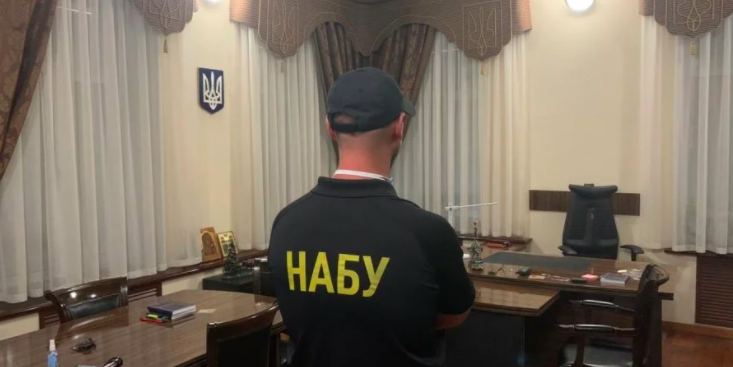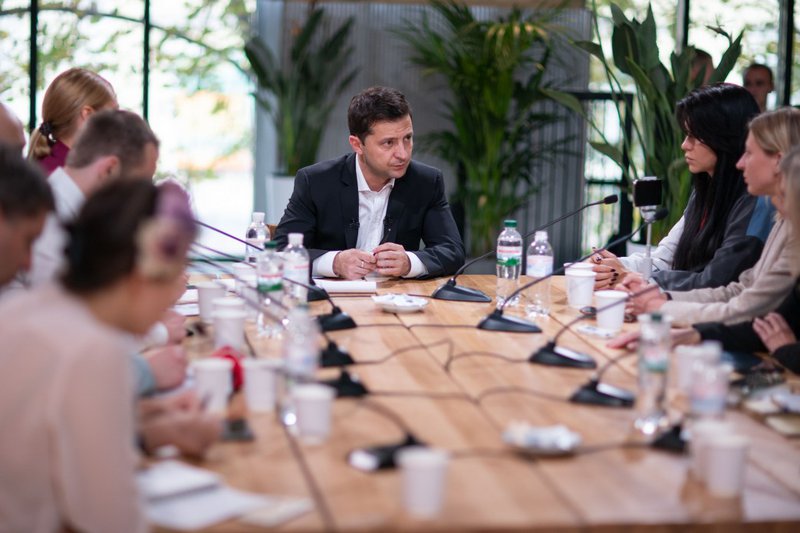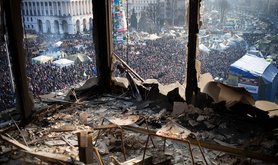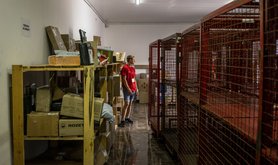
The court that rules Ukraine
Two successive presidents have promised to deal with an influential Kyiv court accused of corruption. Why can’t they?

At the centre of Ukraine’s capital city sits a squat court building that is embroiled in an ongoing national scandal – although few seem to be interested.
In the past few years, the Kyiv Regional Administrative Court has dismissed ministers, appointed new ones, revoked the nationalisation of a fraud-afflicted bank and given the go-ahead for security forces to storm a protest site during the Euromaidan revolution of 2013-14.
Indeed, the National Anti-Corruption Bureau of Ukraine (NABU) believes that the court is home to a “criminal organisation” run by its head, Pavlo Vovk. Vovk denies these accusations.
After Volodymyr Zelenskyi was elected president in 2019, he promised to “deal with the issue” when asked about Kyiv Regional Administrative Court.
But a year later, the president is yet to provide any further information about his promise, which looks set to follow the path of a similar announcement by his predecessor Petro Poroshenko. In 2017, then-president Poroshenko declared his intention to abolish the Kyiv Regional Administrative Court - only for it to later disappear from a list of courts set for liquidation.
Caught on tape
On paper, the Kyiv Regional Administrative Court considers claims brought by Ukrainian citizens against state bodies: ministries, parliament and anti-corruption agencies.
One of the court’s best-known decisions came in December 2013, when a judge issued a decision to clear protesters from Khreshchatyk, Kyiv’s central street. This effectively permitted security forces to storm the Euromaidan camp on 11 December.
The court went on to issue several more controversial decisions, such as removing the acting Minister of Health, Ulyana Suprun, from her post and reinstating the head of Ukraine’s fiscal service Roman Nasirov, despite embezzlement charges against him. In August 2019, the court revoked the nationalisation of Privatbank, which had lost $5.5 billion in alleged insider-loans to its now former oligarch owners, Ihor Kolomoiskyi and Henadiy Boholyubov. In August this year, the court received a lawsuit that aims to de-register the governing Servant of the People party.
“This court can fulfil political orders of various kinds,” says Mykhailo Zhernakov, a lawyer who works for the DEJURE Foundation, a civic reform organisation. “Given its jurisdiction, there is too much power concentrated in this court for examining and re-examining [the] decisions of virtually any central government body located in Kyiv.”
“It’s a lot easier to have this court under control and open to influence than to have it independent,” he says.
Leaked tapes allegedly show judges discussing plans to issue unjust court decisions and interfere with the work of the High Qualification Commission of Judges
In summer 2019, NABU detectives and officials from the General Prosecutor’s Office searched the Kyiv Regional Administrative Court. While the search was under way, NABU director Artem Sytnik and Serhiy Horbatyuk – then head of special investigations at the General Prosecutor’s Office – released covert audio recordings of conversations between court officials, at a joint press conference.
The tapes allegedly show judges at the Kyiv Regional Administrative Court discussing plans to issue unjust court decisions and interfere with the work of the High Qualification Commission of Judges, which monitors the country’s judges. The recordings also contain references to Lyudmyla Denisova, Ukraine’s parliamentary commissioner on human rights. According to investigators, Denisova helped Vovk place a judge on the qualification commission. Denisova has not commented on these allegations.
In response, the prosecutor’s office charged three judges in the Kyiv Regional Administrative Court – Vovk, Yevhen Ablov and Ihor Pohribnychenko – as well as Ivan Shepitko, a district judge in Odessa, with interfering in the work of state bodies. Speaking at the time, Vovk called the recordings “a lie from beginning to end”. He said the voices on the tapes were similar to those of judges in the administrative court, but that the conversations had been edited out of context.
A month after the revelations in 2019, Vovk, some ten years in the post, resigned, only to take up his position once again this year.

At Zelenskyi’s first major press conference in 2019, journalists asked the new president when he would sign a decree to abolish the court – or whether, like his predecessor Poroshenko, Zelenskyi also needed a “convenient” court.
“I don’t need anybody to be ‘convenient’,” Zelenskyi said at the time. “I’m ready to look into this issue, ready to sign a decree that will help justice, and there’s no question over the Regional Administrative Court […] I haven’t had this issue yet. I haven’t even talked it through with my team. I don’t know what stage this issue is at.”
A little less than a year after Zelenskyi’s statement, NABU published new covert recordings of conversations among the court’s judges. The new recordings, which were released in July 2020, allegedly contain conversations about influencing judges on Ukraine’s Constitutional and Supreme Courts, as well as members of NABU, the High Qualification Commission of Judges, the State Bureau of Investigation and the police.
The National Anti-Corruption Bureau (NABU) and the Specialised Anti-Corruption Prosecutor’s Office have since charged Vovk and his deputy Ablov again, as well as five other judges of the court. According to the investigation, these judges are part of a “criminal organisation” that has “issued court decisions in their own interests, as well as the interests of political elites and business circles”. In particular, the investigators claimed that “the head of the Kyiv Regional Administrative Court used a scheme to file artificial and fabricated administrative cases to his own court from fake civic organisations and individuals”. These cases were then, according to NABU investigators, “examined very quickly and with a predetermined result.”
Vovk has denied these new allegations. “If we talk about law, and not about politics, then we should note that these new charges are based on the same facts as a year ago,” he wrote on Facebook in July. “These facts have already been assessed. Forensic analyses prove that these tapes have been fabricated. All conceivable norms of the Criminal Procedural Code have been violated.”
In a media interview, Vovk went on to say that the tapes “are revenge for the fact that the Regional Administrative Court is independent”, and that the court is “one of the bastions of independence in the judicial branch”. He also stated that Artem Sytnyk, director of NABU, is involved in several criminal cases under consideration at the Kyiv Regional Administrative Court and “these decisions are painful for him”. In October, the court approved a decision to fire Sytnyk from his post at NABU, though the Ministry of Justice has said it will not carry out the decision.
Zhernakov, of the DEJURE Foundation, told openDemocracy that if the court is abolished, some of its cases will be referred to the Supreme Court of Ukraine. “The only way to remove these judges from their posts is to liquidate this court,” he says. “The only person who can do this is Zelenskyi, under the constitution. [Yet] he doesn’t do it.”
“Deeply-rooted corruption”
In July this year, a public petition demanding the court be shut down appeared on the website of the Ukrainian President’s Office. Its authors argued that the court had “lost its authority” and that the recordings were evidence of “deeply-rooted corruption”. The petition attracted the required number of signatures to prompt an official response; in October, Zelenskyi announced that he had issued instructions to begin “appropriate consultations with Ukraine’s Supreme Council of Justice to obtain the position of the constitutional body of judicial management.”
There are reasons to believe this process may not be entirely reliable. The Supreme Council of Justice – not to be confused with the High Qualification Commission of Judges – also appears in the NABU tapes. According to the investigation, the judges of the Kyiv Regional Administrative Court have also influenced the work of this body, which advises on the appointment and release of judges.
While the investigation into Vovk and his colleagues continues, there are serious wider concerns about the independence of the judiciary
The revelations suggest that judges in the Kyiv Regional Administrative Court have been conspiring to use their positions for political gain. Yet this has not led to protests among Ukrainian citizens. One reason is the complexity of the case: it is enough of a task for journalists to explain clearly what all the different institutions do – and who investigators say influenced whom.
In July, president Zelenskyi introduced a bill on judicial reform to the Verkhovna Rada, Ukraine’s parliament. This bill is designed to regulate the way judges are appointed, and will require the formation of a new High Qualification Commission of Judges, which is the national body that evaluates and selects judges.
Creating a new commission, free from the suggestion of corruption, will be difficult. The two institutions responsible for proposing and approving new members – the Supreme Council of Justice and the parliamentary commissioner for human rights – also feature in the NABU recordings.
Ukraine began to reform its judiciary in 2016, when all judges had to undergo mandatory recertification, being tested on their legal knowledge, as well as their integrity. But this case suggests that judges still wield considerable power as individuals.
While the investigation into Vovk and his colleagues continues, there are serious wider concerns about the independence of the judiciary. For as long as these remain, so will the suspicion you can make any problem go away in Ukraine – if you can find the right judge.
Read more
Get our weekly email





Comments
We encourage anyone to comment, please consult the oD commenting guidelines if you have any questions.